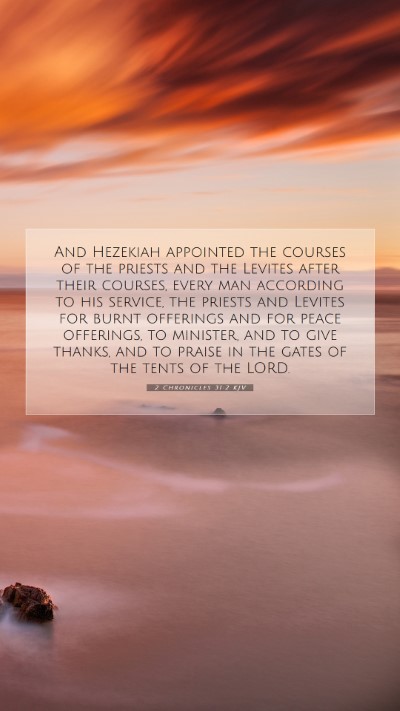Understanding the Meaning of 2 Chronicles 31:2
The verse 2 Chronicles 31:2 states:
"And Hezekiah appointed the courses of the priests and the Levites after their courses, every man according to his service, the priests and Levites for burnt offerings and for peace offerings, to minister, and to give thanks, and to praise in the gates of the tents of the LORD."
Bible Verse Explanation
This verse provides insight into the religious reforms of King Hezekiah, focusing on the organization and duties of the priests and Levites in the temple worship. Below are various interpretations and commentaries that provide a deeper understanding of this passage.
1. Historical Context
Hezekiah was a king of Judah who reigned during a time of national crisis and moral decay. His efforts to restore proper worship practices were crucial for the spiritual revival of the nation. This verse illustrates his commitment to re-establishing the Levitical priesthood and their designated roles, ensuring that worship was conducted appropriately.
-
Matthew Henry Commentary:
Henry emphasizes that Hezekiah's actions demonstrate the importance of orderliness in religious practices. By appointing the priests and Levites according to their courses, Hezekiah honors the traditional structure established by David, affirming the value of divine order in worship.
-
Albert Barnes Commentary:
Barnes notes that this organization not only restores the worship of Yahweh but serves as a model for future generations. He highlights the significance of each priest and Levite's function and their commitment to a life of service, ensuring the continuation of worship in Israel.
-
Adam Clarke Commentary:
Clarke points out that Hezekiah's establishment of courses was a revival of the earlier system that ensured the regular and accountable performance of worship duties. He underscores that this restoration signifies a return to faithfulness and dedication to God.
Biblical Significance
This verse illustrates principles crucial for understanding biblical leadership and worship:
- Divine Order: The appointment of priests and Levites reflects the structured approach God has towards worship and service, emphasizing how integral order is in the relationship between God and His people.
- Community Responsibility: Each member's role underscores the collective effort required in worship. The community's participation is vital for establishing a thriving spiritual environment.
- Faithful Servants: By highlighting the priests' and Levites' roles, the verse encourages individuals to see their service in the church community as an essential part of spiritual life.
A Modern Application
For contemporary believers, this passage serves as a reminder of the importance of organization and commitment in church practices. It encourages:
- Active Participation: Just as the priests and Levites had defined roles, modern church members are called to understand and fulfill their responsibilities within the congregation.
- Commitment to Worship: The verse emphasizes that worship is not just an individual act but a communal celebration that requires dedication and effort from all members.
- Spiritual Prioritization: Hezekiah’s reforms challenge believers today to prioritize their spiritual lives and make necessary adjustments to ensure true worship and service to God.
Cross References
This verse relates to several other passages in the Bible that reflect similar themes:
- 1 Chronicles 23:1-6: Discusses David's organization of the Levites for service in the house of the LORD.
- 2 Kings 23:4-5: Describes reforms under King Josiah that also sought to restore proper worship and eliminate idolatry.
- Exodus 29:44-46: Explains God's instructions for the priests and the sanctification of the Tabernacle as a holy place for worship.
Conclusion
2 Chronicles 31:2 reveals fundamental truths about leadership in worship and the community's role in serving the Lord. Its implications for both the ancient Israelites and modern believers highlight the enduring significance of proper worship, structure, and communal responsibility. By studying this verse within its historical and scriptural context, we gain invaluable insights into the nature of godly order and service.


